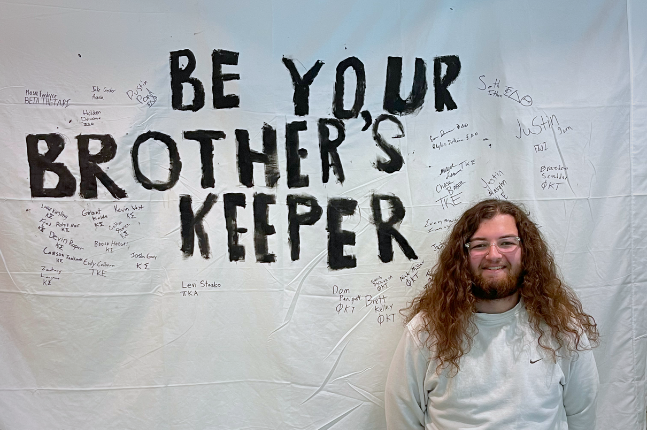Ohio University Phi Creates Campus’ First-Ever MENtal Health Week
Phi Delta Theta challenges its members to live a life of continuous learning, and we invest in educational experiences that offer new dimensions of knowledge that may not be taught in the classroom, such as soft skills, work ethic, leadership, and compassion for others.
Seth Totten, Ohio ’25, sought to transmit what he had learned from the 2023 Kleberg Emerging Leaders Institute, funded by the Phi Delta Theta Foundation, to create a campus-wide event to promote mental health in young men. A participant of last year’s Chaplain Track at the Kleberg Emerging Leaders Institute, Seth was inspired by the topics of diversity and inclusion and mental wellbeing, and took what he learned to create a new culture of mental health and diversity and inclusion within his chapter and campus community.
“If I didn’t go to Kleberg, there’s no way that I could have stepped up to be the president I needed to be, it helps build the skills that you don’t know that you need to have,” Totten stated.
According to a recent Kaiser Family Foundation-CNN poll, 90 percent of Americans believe that our country is undergoing a mental health crisis. This crisis is particularly profound among young people. Roughly a third of young adults (ages 18-29) describe their mental health as “only fair” or “poor” compared to 19 percent of adults over thirty. Fifty-two percent of young adults also report feeling anxious “often” or “always,” whereas only 28 percent of adults over thirty report similar levels of anxiety. Overall, a little more than one in three young people say a mental health condition has made them “unable to work or engage in other activities.”[1]
Phi Delta Theta is not immune to the mental health crisis, but we continue to remind brothers of the hard work of being our brother’s keeper, working to ensure that all of our members have the support systems they need to thrive in college and beyond.
“There’s a lot of societal pressure for men to not talk about mental health, and there’s not a lot of emphasis around men receiving help,” Totten said.
Seth decided to take Be Your Brothers Keeper a step further, opening it up to every brother of every fraternity at Ohio University by creating the campus’ first-ever MENtal Health Week, which was hosted March 25-29, 2024. In partnership with the FSL office, Seth created this week-long program highlighting mental health resources for college-aged men, referencing what he learned from the Kleberg Emerging Leaders Institute. Here is what the week looked like:
Monday: A speaker from Ohio University’s Office of Counseling and Psychological Services spoke to members of the IFC discussing the resources available to students, both on and off-campus.
Tuesday: An all-Greek LGBTQ+ seminar.
Wednesday: An open forum discussion hosted by Seth and IFC executive officers with activities. One of the activities was one that Seth learned from Kleberg, the ‘Tree of Life’, a psychology exercise based on the idea of using the tree as a metaphor to tell stories about one’s experiences.
Thursday: A Be Your Brother’s Keeper pledge in the student union, where students could sign a banner to promise to be there for their brothers in times of need.
Friday: A social event called Fridays are for the Boys where students could relax, recharge, and connect with members of the IFC community with games, tv, and pizza.

Seth thanks several Phi Delta Theta alumni volunteers for helping with the creation of MENtal Health Week, including Chapter Advisory Board Chairman Chris Quolke, Ohio ’09, Fraternity Chaplain Rev. Michael J. Schulte, Westminster ’14, and Diversity and Inclusion Commissioner, Austin A. Deray, Mercer ’10. Seth also attributes a huge help to Ohio University’s Director of Sorority and Fraternity Life, Chris Medrano Graham.
